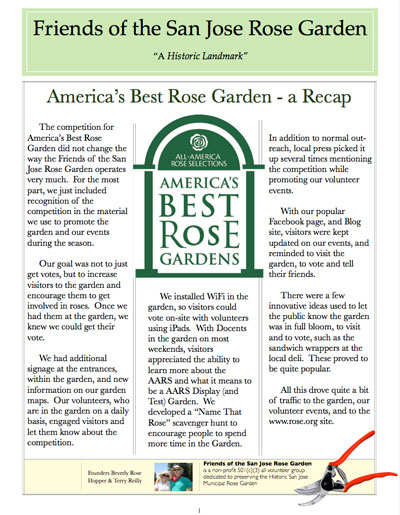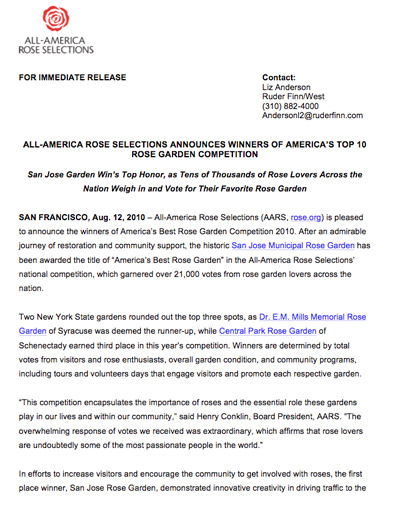In 2010, the All-America Rose Selections, the 70 year old nonprofit association dedicated to the introduction and promotion of exceptional roses, organized a nationwide competition to find the best public rose gardens and select a winner to become “America’s Best Rose Garden”. The voting officially started on April 1st, 2010 and closed July 1st, 2010. The top ten gardens with the most individual votes will become finalists. Then, a panel of experts from AARS will travel to the five finalist cities, evaluate the gardens, and select one winner based on beauty, creativity and the garden’s overall contribution to its community. The winning garden would receive a $2,500 cash donation and will be featured in a national PR campaign highlighting the best gardens in America.
So what happened? Well, you guess it – WE WON! Thanks to everyone that made this happen! Read the articles about the competition by clicking the articles below:
Scott Herhold, San Jose Mercury News Features FSJRG’s campaign to win America’s Best Rose Garden
The Garden won the award due to hard work of the dedicated City Staff and Volunteers. A recap of the techniques used to promote the garden and win the award can be read below my clicking the image:
You can read the All-AmericanRose Selections press release about the winners by clicking the image below:
And here is the Mercury News Article that announced this prestigious honor:
S.J. Municipal Rose Garden named ‘America’s Best’
Posted: 08/11/2010 10:00:00 PM PDT
By Linda Zavoral
Hey, Portland and Pasadena! There’s a new queen of roses.
Just a few years after being put on horticultural probation, the San Jose Municipal Rose Garden has not only salvaged its reputation but will be named today as “America’s Best Rose Garden,” beating out more than 130 public rose gardens nationwide.
In the process, it’s become a model for how to care for a community garden at a time of declining government and park budgets.
The award, from All-America Rose Selections, a nonprofit association of rose growers, is the first by the association best known for its rigorous testing of new varieties of roses. Its work has led to the introduction of such classic roses as Peace, Mr. Lincoln and Double Delight. All-America Rose Selections, which also accredits gardens, put the disheveled San Jose garden on probation in 2005 and then noted its transformation by lifting the probation status in 2008.
“The amazing work that the Friends of San Jose Rose Garden, the volunteers and park staff have done to turn the garden around is truly wonderful,” said Henry Conklin, the Arizona-based president of All- America Rose Selections. “Their spirit, creativity and love of roses is emblematic of why the America’s Best Rose Garden competition was created.”
News of the award, which will be announced officially today, thrilled flower enthusiasts and civic leaders alike.
“I’m just ecstatic that we’ve gone from a park that was on probation — and, frankly, with weeds taller than I am — to the No. 1 rose garden in the U.S.,” said San Jose Councilman Pierluigi Oliverio, whose district includes the rose garden.
For Dan Fenton, CEO of Team San Jose and his team of tourism officials, “It’s a big deal. We will use it as a way to market San Jose as a destination,” he said. With this new national distinction, he said, the garden can be promoted as a reception site for conventioneers visiting town and a must-see for tourists.
In 2007, Oliverio suggested that the city outsource its garden maintenance to a private contractor — a failed proposal that upset union workers and ignited volunteer efforts by local rose enthusiasts Terry Reilly and Beverly Rose Hopper. They cofounded the Friends of the San Jose Municipal Rose Garden.
Oliverio said Wednesday that both the volunteers and city staffers deserve the credit for the transformation. The key, Reilly said, was in getting people to understand how passionate gardeners are about their hobby and then channeling that interest. “Some people hike (for recreation). Some bike. They walk their dogs. Some like to garden, pull weeds and pick roses.”
Volunteers now average a total of 150 hours a week and thousands of hours since the group was formed in 2007. To assuage city fears about just anybody stopping by to prune or weed, the group trains volunteers and issues official vests to those who pass muster.
It’s not unusual to see a vested volunteer or two or three toiling just after 8 a.m., when the garden opens, or at dusk, close to closing time, Reilly said.
For the first-ever competition, All-America Rose Selections (www.rose.org) asked individuals to vote for their favorite local rose garden. The results were weighted by attendance numbers to put smaller and larger gardens on the same footing. All-America Rose Selections judges then evaluated the top 10 finalists on their “beauty, creativity and the garden’s overall contribution to the community.”
Two New York state gardens — the Dr. E.M. Mills Memorial Rose Garden in Syracuse and the Central Park Rose Garden of Schenectady — earned second and third place, respectively. Sacramento’s State Capitol World Peace Rose Garden and Oakland’s Morcom Rose Garden also made the top 10. Absent were Oregon’s “City of Roses,” Portland, and its famed International Rose Garden, as well as rose gardens in and near the Tournament of Roses city of Pasadena.
San Jose received “far and above” the most votes, spokesman Joe Foster said.
The title of “America’s Best Rose Garden” comes with a check for $2,500 — and bragging rights aplenty. A Sept. 4 event is planned for the check presentation, with plenty of those vaunted
volunteers expected to be in attendance.
“This award is a fabulous demonstration of how important volunteers are to our community,” Hopper said. “They’re priceless, really.”
Now, other gardens around the country are looking to replicate San Jose’s success with volunteers. Reilly and Hopper have been approached for advice by the people who run Sacramento’s McKinley Park Rose Garden, the Morcom Rose Garden in Oakland and an 800-plant garden, the Walnut Hill Park Rose Garden, that opened this year in New Britain, Conn.
Kate McCue, the Connecticut project coordinator, proposed resurrecting a 1929 rose garden that had thrived until city budget cuts in the 1980s left it to grow wild. It was ultimately plowed under. The city said the restoration was OK — if McCue and her group could raise private money and handle garden maintenance.
“I modeled it after the volunteer project that San Jose has run so successfully,” McCue said. “We’ve modeled everything — the training, the supervised hours, the parties. It’s worked so well here. I’ve made no secret of the fact that San Jose has been one of the critical advisers in the success of our garden.”



